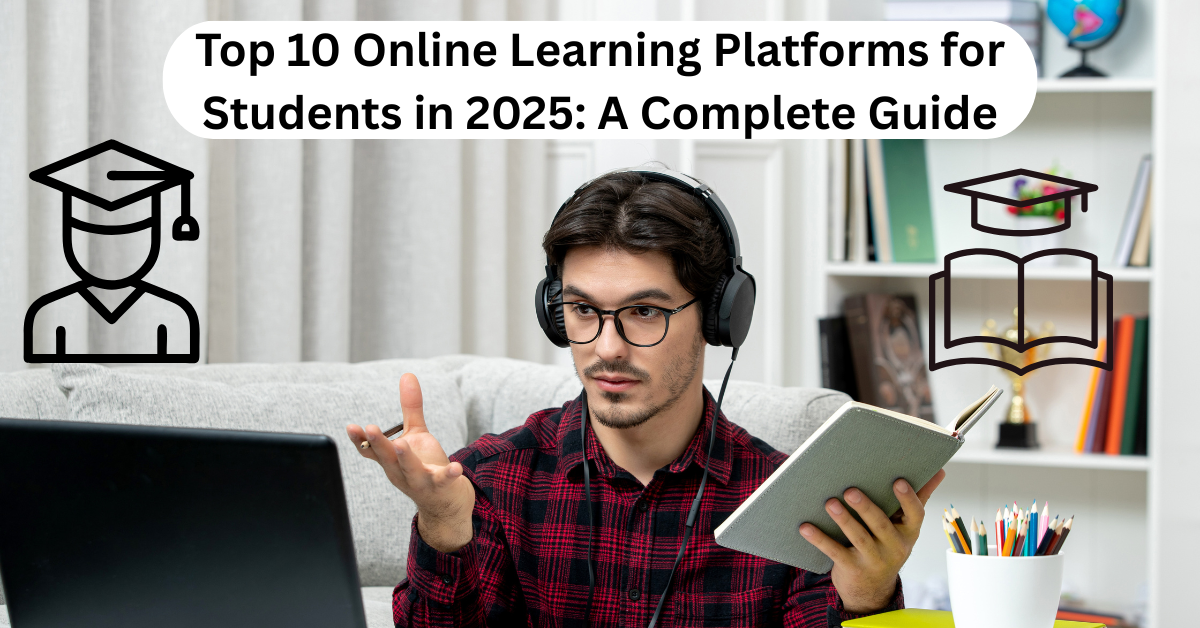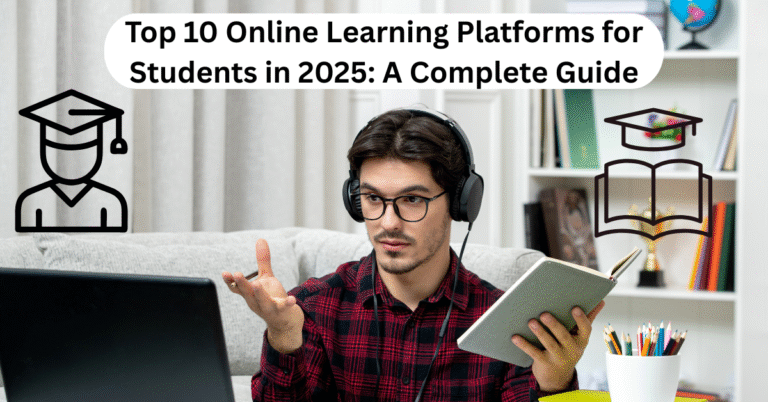
Online learning platforms has transformed education in 2025. With the rise of e-learning platforms, students can now access high-quality courses, certifications, and skill-building programs from anywhere in the world. These platforms not only supplement traditional classroom education but also provide opportunities for lifelong learning and career advancement.
In this comprehensive guide, we explore the top 10 online learning platforms for students, their features, pricing, pros and cons, and how they can help you achieve your learning goals in 2025.
1. Coursera
Overview: Learning Platforms
Coursera collaborates with over 200 top universities and companies worldwide to provide courses in technology, business, arts, health, and more. It offers certificates, professional courses, and even full degree programs.
Pricing:
- Free courses available
- Paid courses: $29–$99 per course
- Coursera Plus subscription: $399/year (access to 7,000+ courses)
Pros:
- Courses from world-class universities like Stanford and Yale
- Flexible schedule for students
- Verified certificates recognized by employers
Cons:
- Some certifications are expensive
- Limited free courses with certificates
Why Choose Coursera:
Coursera is ideal for students aiming for professional growth or looking to enhance their academic credentials. With flexible learning paths and verified certificates, it’s suitable for college and university students.
2. Udemy
Overview:
Udemy hosts over 200,000 courses in a wide variety of subjects, including programming, marketing, personal development, and more. It allows instructors to create and sell courses, making it diverse and extensive.
Pricing:
- Most courses: $10–$50 (with frequent discounts)
- Lifetime access to purchased courses
Pros:
- Affordable pricing with lifetime access
- Wide variety of topics and instructors
- Frequent sales and discounts
Cons:
- Quality varies between courses
- No formal accreditation for most courses
Why Choose Udemy:
Udemy is best for students who want to learn new skills at their own pace and budget. The platform is flexible, affordable, and covers almost every subject imaginable.
3. Khan Academy
Overview:
Khan Academy is a nonprofit platform offering free educational content for students from K-12 to college-level subjects. It’s known for its clear explanations and interactive exercises.
Pricing:
- Completely free
Pros:
- High-quality free resources
- Interactive exercises and quizzes
- Trusted worldwide by millions of students
Cons:
- Limited advanced or professional courses
- Less focus on vocational or career skills
Why Choose Khan Academy:
Perfect for school and college students, Khan Academy provides a strong foundation in core subjects and helps with exam preparation and concept mastery.
4. edX
Overview:
Founded by Harvard and MIT, edX provides online courses, micro-masters programs, and professional certificates. Its courses cover a wide range of academic and professional topics.
Pricing:
- Free courses available
- Verified certificates: $50–$300
- MicroMasters programs: $600–$1,500
Pros:
- University-level courses
- Professional certificates and degrees
- Flexible learning schedule
Cons:
- Some courses can be expensive
- Certificates require additional payment
Why Choose edX:
Students seeking credible university-level learning and professional growth will benefit most from edX. It’s perfect for academic enhancement and career development.
5. Skillshare
Overview:
Skillshare specializes in creative learning. Students can learn design, photography, video editing, marketing, and more through project-based lessons.
Pricing:
- Free trial available
- Premium membership: $168/year ($14/month)
Pros:
- Project-based and hands-on learning
- Thousands of creative courses
- Affordable subscription model
Cons:
- Less academic content
- Certificates not recognized by universities
Why Choose Skillshare:
Ideal for students who want to explore creative fields or enhance practical skills. Skillshare is perfect for developing portfolios and hands-on expertise.
6. LinkedIn Learning
Overview:
LinkedIn Learning offers courses in business, technology, and creative fields with certifications integrated into LinkedIn profiles.
Pricing:
- Free trial: 1 month
- Subscription: $39.99/month or $299.88/year
Pros:
- Professional certificates
- Integration with LinkedIn profiles
- High-quality industry-focused courses
Cons:
- Expensive compared to other platforms
- Limited non-professional content
Why Choose LinkedIn Learning:
Students aiming for professional skills and industry recognition benefit from LinkedIn Learning. It is excellent for career development and resume enhancement.
7. FutureLearn
Overview:
FutureLearn partners with global universities to offer online courses, micro-credentials, and short programs in multiple subjects.
Pricing:
- Free access for 2–4 weeks
- Upgraded courses: $39–$249
- Micro-credentials: $200–$600
Pros:
- Flexible short courses
- Micro-credentials for professional growth
- Strong learning community
Cons:
- Limited access to some free courses
- Certificates require payment
Why Choose FutureLearn:
FutureLearn is ideal for students who want flexible learning with a global perspective and want to earn micro-credentials for career advancement.
8. Pluralsight
Overview:
Pluralsight focuses on technical and IT skills, including software development, cybersecurity, cloud computing, and data science.
Pricing:
- Free trial: 10 days
- Subscription: $29/month or $299/year
Pros:
- Skill assessments and learning paths
- Courses for IT and technical careers
- Trusted by technology professionals
Cons:
- Focused mainly on technical skills
- Premium subscription required for full access
Why Choose Pluralsight:
Pluralsight is perfect for students aspiring for IT, software, or tech-based careers. It provides in-depth learning paths and industry-relevant skills.
9. Duolingo
Overview:
Duolingo offers language learning for students through gamified lessons, interactive exercises, and a fun approach to learning new languages.
Pricing:(Learning Platforms)
- Free version available
- Duolingo Plus: $6.99/month
Pros:
- Supports multiple languages
- Interactive and fun learning
- Tracks progress and motivates learners
Cons:
- Limited advanced language courses
- Premium subscription needed for ad-free experience
Why Choose Duolingo:
Students interested in learning new languages in an engaging and gamified way will benefit from Duolingo. It’s suitable for beginners and casual learners.
10. Byju’s
Overview:
Byju’s provides interactive courses for school students, focusing on conceptual understanding, exam preparation, and personalized learning.
Pricing:(Learning Platforms)
- Free demo available
- Full courses: $300–$1,000/year depending on grade level
Pros:
- Comprehensive K-12 curriculum
- Engaging video lessons and quizzes
- Exam preparation support
Cons:
- Expensive for some students
- Focused mainly on school-level education
Why Choose Byju’s:
Byju’s is ideal for school students who want a strong foundation, conceptual learning, and exam success. It’s widely used in India and increasingly globally.
Comparison Table: Key Features of Top 10 Online Learning Platforms

| Platform | Best For | Pricing | Certificates | Accessibility |
|---|---|---|---|---|
| Coursera | Academic & Career | $29–$399/year | Yes | Web & Mobile |
| Udemy | Skill Learning | $10–$50/course | Optional | Web & Mobile |
| Khan Academy | School Students | Free | No | Web & Mobile |
| edX | Academic & Professional | Free–$1,500 | Yes | Web & Mobile |
| Skillshare | Creative Skills | $14/month | No | Web & Mobile |
| LinkedIn Learning | Professional Skills | $39.99/month | Yes | Web & Mobile |
| FutureLearn | Micro-credentials | $39–$600 | Yes | Web & Mobile |
| Pluralsight | IT & Tech Careers | $29/month | Yes | Web & Mobile |
| Duolingo | Language Learning | Free–$6.99/month | No | Web & Mobile |
| Byju’s | School Students | $300–$1,000/year | No | Web & Mobile |
Tips to Choose the Right Online Learning Platforms in 2025

- Identify Your Goals: Academic growth, career development, or skill acquisition.
- Check Course Quality: Read reviews, course syllabus, and instructor credentials.
- Consider Pricing & Budget: Free courses, subscriptions, or one-time payments.
- Look for Flexibility: Choose platforms that allow self-paced learning.
- Check Certification Value: Consider if certificates are recognized by employers or universities.
- Test Free Trials: Most platforms offer free courses or trials—test them before committing.
How to Maximize Your Online Learning Platforms

- Create a study schedule and stick to it.
- Take notes and summarize lessons.
- Apply what you learn with projects or exercises.
- Join discussion forums and communities to interact with peers.
- Track your progress and celebrate milestones.
Conclusion (Learning Platforms)
In 2025, online learning platforms have revolutionized how students learn, offering flexibility, accessibility, and a wide range of courses. Platforms like Coursera and edX are ideal for academic and professional growth, while Skillshare and Duolingo are excellent for creative and practical skills.
Choosing the right platform depends on your learning goals, budget, and interests. Start exploring these platforms today to gain knowledge, enhance skills, and prepare for a brighter future. Learning Platforms
Official Links for Top 10 Online Learning Platforms
- Coursera
- Udemy
- Khan Academy
- edX
- Skillshare
- LinkedIn Learning
- FutureLearn
- Pluralsight
- Duolingo
- Byju’s
🔗 Need more scholarships? Visit our main resource hub at mirrorkk.com




